 To paraphrase Al Pacino in “Godfather III,” just when we thought we were out, the Bush mob keeps pulling us back in. And will keep doing so. No matter how hard President Obama tries to turn the page on the previous administration, he can’t. Until there is true transparency and true accountability, revelations of that unresolved eight-year nightmare will keep raining down drip by drip, disrupting the new administration’s high ambitions. That’s why the president’s flip-flop on the release of detainee abuse photos — whatever his motivation — is a fool’s errand. The pictures will eventually emerge anyway, either because of leaks (if they haven’t started already) or because the federal appeals court decision upholding their release remains in force. And here’s a bet: These images will not prove the most shocking evidence of Bush administration sins still to come.
To paraphrase Al Pacino in “Godfather III,” just when we thought we were out, the Bush mob keeps pulling us back in. And will keep doing so. No matter how hard President Obama tries to turn the page on the previous administration, he can’t. Until there is true transparency and true accountability, revelations of that unresolved eight-year nightmare will keep raining down drip by drip, disrupting the new administration’s high ambitions. That’s why the president’s flip-flop on the release of detainee abuse photos — whatever his motivation — is a fool’s errand. The pictures will eventually emerge anyway, either because of leaks (if they haven’t started already) or because the federal appeals court decision upholding their release remains in force. And here’s a bet: These images will not prove the most shocking evidence of Bush administration sins still to come.
There are many dots yet to be connected, and not just on torture. This Sunday, GQ magazine is posting on its Web site an article adding new details to the ample dossier on how Donald Rumsfeld’s corrupt and incompetent Defense Department cost American lives and compromised national security. The piece is not the work of a partisan but the Texan journalist Robert Draper, author of “Dead Certain,” the 2007 Bush biography that had the blessing of the former president and his top brass. It draws on interviews with more than a dozen high-level Bush loyalists.
… But Draper’s biggest find is a collection of daily cover sheets that Rumsfeld approved for the Secretary of Defense Worldwide Intelligence Update, a highly classified digest prepared for a tiny audience, including the president, and often delivered by hand to the White House by the defense secretary himself. These cover sheets greeted Bush each day with triumphal color photos of the war headlined by biblical quotations. GQ is posting 11 of them, and they are seriously creepy.
Take the one dated April 3, 2003, two weeks into the invasion, just as Shock and Awe hit its first potholes. Two days earlier, on April 1, a panicky Pentagon had begun spreading its hyped, fictional account of the rescue of Pvt. Jessica Lynch to distract from troubling news of setbacks. On April 2, Gen. Joseph Hoar, the commander in chief of the United States Central Command from 1991-94, had declared on the Times Op-Ed page that Rumsfeld had sent too few troops to Iraq. And so the Worldwide Intelligence Update for April 3 bullied Bush with Joshua 1:9: “Have I not commanded you? Be strong and courageous. Do not be terrified; do not be discouraged, for the LORD your God will be with you wherever you go”…
The GQ article isn’t the only revelation of previously unknown Bush Defense Department misbehavior to emerge this month. Just two weeks ago, the Obama Pentagon revealed that a major cover-up of corruption had taken place at the Bush Pentagon on Jan. 14 of this year — just six days before Bush left office. This strange incident — reported in The Times but largely ignored by Washington correspondents preparing for their annual dinner — deserves far more attention and follow-up.
What happened on Jan. 14 was the release of a report from the Pentagon’s internal watchdog, the inspector general. It had been ordered up in response to a scandal uncovered last year by David Barstow, an investigative reporter for The Times. Barstow had found that the Bush Pentagon fielded a clandestine network of retired military officers and defense officials to spread administration talking points on television, radio and in print while posing as objective “military analysts.” Many of these propagandists worked for military contractors with billions of dollars of business at stake in Pentagon procurement. Many were recipients of junkets and high-level special briefings unavailable to the legitimate press. Yet the public was never told of these conflicts of interest when these “analysts” appeared on the evening news to provide rosy assessments of what they tended to call “the real situation on the ground in Iraq.”
When Barstow’s story broke, more than 45 members of Congress demanded an inquiry. The Pentagon’s inspector general went to work, and its Jan. 14 report was the result. It found no wrongdoing by the Pentagon. Indeed, when Barstow won the Pulitzer Prize last month, Rumsfeld’s current spokesman cited the inspector general’s “exoneration” to attack the Times articles as fiction. But the Pentagon took another look at this exoneration, and announced on May 5 that the inspector general’s report, not The Times’s reporting, was fiction. The report, it turns out, was riddled with factual errors and included little actual investigation of Barstow’s charges… If the Pentagon inspector general’s office could whitewash this scandal, what else did it whitewash?
In 2005, to take just one example, the same office released a report on how Boeing colluded with low-level Pentagon bad apples on an inflated $30 billion air-tanker deal. At the time, even John Warner, then the go-to Republican senator on military affairs, didn’t buy the heavily redacted report’s claim that Rumsfeld and his deputy, Paul Wolfowitz, were ignorant of what Warner called “the most significant defense procurement mismanagement in contemporary history.” The Pentagon inspector general who presided over that exoneration soon fled to become an executive at the parent company of another Pentagon contractor, Blackwater.
The administration can’t “just keep walking” because it is losing control of the story. The Beltway punditocracy keeps repeating the cliché that only the A.C.L.U. and the president’s “left-wing base” want accountability, but that’s not the case. Americans know that the Iraq war is not over. A key revelation in last month’s Senate Armed Services Committee report on detainees — that torture was used to try to coerce prisoners into “confirming” a bogus Al Qaeda-Saddam Hussein link to sell that war — is finally attracting attention. The more we learn piecemeal of this history, the more bipartisan and voluble the call for full transparency has become…
I’m not a fan of Washington’s blue-ribbon commissions, where political compromises can trump the truth. But the 9/11 investigation did illuminate how, a month after Bush received an intelligence brief titled “Bin Laden Determined to Strike in U.S.,” 3,000 Americans were slaughtered on his and Cheney’s watch. If the Obama administration really wants to move on from the dark Bush era, it will need a new commission, backed up by serious law enforcement, to shed light on where every body is buried.
In the law, the question of premeditation weighs heavily on the guilty. People caught up in the heat of the moment are judged differently than those with "malice of forethought." As we learn from the increasing details finally making the internal workings of our government clear, this was not a bunch of people trying to find their way in the wake of a national disaster. This was a bunch of petty people rubbing their personality quirks all over each other [
AND HE SHALL BE JUDGED] while executing a naive and misguided preconceived plan that had little to do with the crisis at hand. Rumsfeld tasked Paul Wolfowitz to find al Qaeda / Hussein ties on the day of the attack. Cheney was planning his "dark side" program within the first week. Condi had already ignored
al Qaeda warnings. They all had. And so they spent the 500 plus days after 911 planning their invasion of Iraq – commandeering the DoD, torturing prisoners, browbeating the C.I.A., setting up an alternative Spook Shop in the DoD [OSP], creating a Media Arm in the White House [WHIG] – busy as beavers doing the wrong thing and ignoring the right thing [and the rest of the country’s business].
 I love President Obama. He’s my favorite of all the choices I’ve been offered in my lifetime. And he’s a kind person, who wants to change the divisive and counterproductive attitudes of America. It’s the right thing to want. But Frank Rich is right, he can’t turn the page on Bush. The chorus is too loud. The information that’s finally coming our way is too disturbing. The persistence of the hate media is too disruptive. But more than that, there’s a fine line between "moving on" and "denial" – the former is laudable, the latter is aiding and abetting. That line was crossed for Obama before he was even in the Senate. It had already happened by the time he got to Washington in 2004.
I love President Obama. He’s my favorite of all the choices I’ve been offered in my lifetime. And he’s a kind person, who wants to change the divisive and counterproductive attitudes of America. It’s the right thing to want. But Frank Rich is right, he can’t turn the page on Bush. The chorus is too loud. The information that’s finally coming our way is too disturbing. The persistence of the hate media is too disruptive. But more than that, there’s a fine line between "moving on" and "denial" – the former is laudable, the latter is aiding and abetting. That line was crossed for Obama before he was even in the Senate. It had already happened by the time he got to Washington in 2004.
Obama’s only real choice is to either let this thing proceed as a media war with court cases and Congressional Hearings popping up all over the place, or a Truth Commission to channel all this generated energy. If he waits much longer, the latter won’t be an option.
I love Frank Rich too. Three weeks ago,
he said:
President Obama can talk all he wants about not looking back, but this grotesque past is bigger than even he is. It won’t vanish into a memory hole any more than Andersonville, World War II internment camps or My Lai. The White House, Congress and politicians of both parties should get out of the way. We don’t need another commission. We don’t need any Capitol Hill witch hunts. What we must have are fair trials that at long last uphold and reclaim our nation’s commitment to the rule of law.
I’m not a fan of Washington’s blue-ribbon commissions, where political compromises can trump the truth. But the 9/11 investigation did illuminate how, a month after Bush received an intelligence brief titled “Bin Laden Determined to Strike in U.S.,” 3,000 Americans were slaughtered on his and Cheney’s watch. If the Obama administration really wants to move on from the dark Bush era, it will need a new commission, backed up by serious law enforcement, to shed light on where every body is buried.
Frank Rich is moving toward the middle. Let’s hope that Obama can do the same thing. It’s a mark of greatness to know when to hold ’em, and know when to fold ’em…


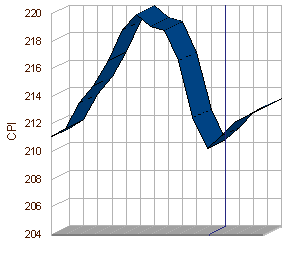
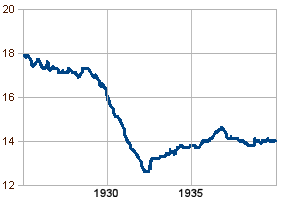
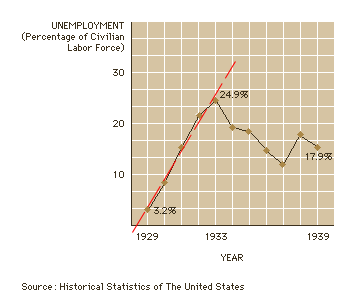
 I feel sorry for the Conservatives of Conscience, people who don’t think like I do but are solid, upstanding human beings whose convictions are strong and well-thought. I know a lot of those people, and I respect them. I hope that goes both ways. Right now, they’re reduced to making a choice between a very sick version of their position and a very healthy version of ours. They can only be quiet or side with the Crazy Contemptuous Conservatives – Cheney, Limbaugh, even Boehner. That’s not really a choice. They worked hard to finally find a winner. What they got was a loser of Napoleonic proportions. At least Napoleon had his moments in the sun before his fall[s]. Napoleon lost big time and was exiled, but he made a comeback, and got beaten again at Waterloo. The second exile took. Let’s hope Cheney’s "comeback" is not so successful as Napoleon.
I feel sorry for the Conservatives of Conscience, people who don’t think like I do but are solid, upstanding human beings whose convictions are strong and well-thought. I know a lot of those people, and I respect them. I hope that goes both ways. Right now, they’re reduced to making a choice between a very sick version of their position and a very healthy version of ours. They can only be quiet or side with the Crazy Contemptuous Conservatives – Cheney, Limbaugh, even Boehner. That’s not really a choice. They worked hard to finally find a winner. What they got was a loser of Napoleonic proportions. At least Napoleon had his moments in the sun before his fall[s]. Napoleon lost big time and was exiled, but he made a comeback, and got beaten again at Waterloo. The second exile took. Let’s hope Cheney’s "comeback" is not so successful as Napoleon.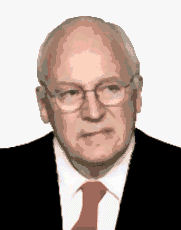 I, for one, don’t like feeling the way I do about him. It doesn’t feel like me inside. Even with Nixon, I had a sympathy for his afflictions. I didn’t think of Nixon so much as evil, I thought of him as sick – that tragic character flaw that Aristotle wrote about, the one I’m always quoting. I don’t feel that for Dick Cheney. He fills me with the feelings of Cheney’s World — hate, evil, revenge, suspicion, dispair. I once went to a favorite sitting place and tried to find some part of myself that could see things Cheney’s way. No luck. I can do it with George Bush, but not with Cheney. Recently, I tried another exercise. I thought back over the times in my life when I’ve felt passion about something, and lost [no, not that kind of passion]. I think in the after-time, the wounds were ultimately replaced by a reflective curiosity, and I learned something surprising about myself and my own convictions.
I, for one, don’t like feeling the way I do about him. It doesn’t feel like me inside. Even with Nixon, I had a sympathy for his afflictions. I didn’t think of Nixon so much as evil, I thought of him as sick – that tragic character flaw that Aristotle wrote about, the one I’m always quoting. I don’t feel that for Dick Cheney. He fills me with the feelings of Cheney’s World — hate, evil, revenge, suspicion, dispair. I once went to a favorite sitting place and tried to find some part of myself that could see things Cheney’s way. No luck. I can do it with George Bush, but not with Cheney. Recently, I tried another exercise. I thought back over the times in my life when I’ve felt passion about something, and lost [no, not that kind of passion]. I think in the after-time, the wounds were ultimately replaced by a reflective curiosity, and I learned something surprising about myself and my own convictions. BANGKOK — Myanmar’s pro-democracy leader, Daw Aung San Suu Kyi, went on trial Monday in a mostly procedural hearing as hundreds of police officers and army soldiers blocked crowds of protesters, according to reports from news agencies and opposition exile groups. Several foreign diplomats were also prevented from entering the court where Mrs. Aung San Suu Kyi faced charges that could bring a prison term of up to five years, according to the reports. A United States Embassy official was allowed to enter because another defendant in the trial is an American man who swam across a lake early this month and spent a night in Mrs. Aung San Suu Kyi’s house.
BANGKOK — Myanmar’s pro-democracy leader, Daw Aung San Suu Kyi, went on trial Monday in a mostly procedural hearing as hundreds of police officers and army soldiers blocked crowds of protesters, according to reports from news agencies and opposition exile groups. Several foreign diplomats were also prevented from entering the court where Mrs. Aung San Suu Kyi faced charges that could bring a prison term of up to five years, according to the reports. A United States Embassy official was allowed to enter because another defendant in the trial is an American man who swam across a lake early this month and spent a night in Mrs. Aung San Suu Kyi’s house. Over the years of treating traumatized people, I learned to avoid the "healing" metaphor. It’s only useful if you recognize that "healing" often leaves a big ugly scar, or a bad limp, or some other disability that must be adapted to. And that’s not what most people mean. They mean those wonderful things that the body can do with minor to moderate cuts and bruises – make them vanish. In something so big as the Bush Years, that option is unavailable. We’ll not be looking for healing here. But the first order of business is diagnosis.
Over the years of treating traumatized people, I learned to avoid the "healing" metaphor. It’s only useful if you recognize that "healing" often leaves a big ugly scar, or a bad limp, or some other disability that must be adapted to. And that’s not what most people mean. They mean those wonderful things that the body can do with minor to moderate cuts and bruises – make them vanish. In something so big as the Bush Years, that option is unavailable. We’ll not be looking for healing here. But the first order of business is diagnosis. To paraphrase Al Pacino in “Godfather III,” just when we thought we were out, the Bush mob keeps pulling us back in. And will keep doing so. No matter how hard President Obama tries to turn the page on the previous administration, he can’t. Until there is true transparency and true accountability, revelations of that unresolved eight-year nightmare will keep raining down drip by drip, disrupting the new administration’s high ambitions. That’s why the president’s flip-flop on the release of detainee abuse photos — whatever his motivation — is a fool’s errand. The pictures will eventually emerge anyway, either because of leaks (if they haven’t started already) or because the federal appeals court decision upholding their release remains in force. And here’s a bet: These images will not prove the most shocking evidence of Bush administration sins still to come.
To paraphrase Al Pacino in “Godfather III,” just when we thought we were out, the Bush mob keeps pulling us back in. And will keep doing so. No matter how hard President Obama tries to turn the page on the previous administration, he can’t. Until there is true transparency and true accountability, revelations of that unresolved eight-year nightmare will keep raining down drip by drip, disrupting the new administration’s high ambitions. That’s why the president’s flip-flop on the release of detainee abuse photos — whatever his motivation — is a fool’s errand. The pictures will eventually emerge anyway, either because of leaks (if they haven’t started already) or because the federal appeals court decision upholding their release remains in force. And here’s a bet: These images will not prove the most shocking evidence of Bush administration sins still to come.
 I love President Obama. He’s my favorite of all the choices I’ve been offered in my lifetime. And he’s a kind person, who wants to change the divisive and counterproductive attitudes of America. It’s the right thing to want. But Frank Rich is right, he can’t turn the page on Bush. The chorus is too loud. The information that’s finally coming our way is too disturbing. The persistence of the hate media is too disruptive. But more than that, there’s a fine line between "moving on" and "denial" – the former is laudable, the latter is aiding and abetting. That line was crossed for Obama before he was even in the Senate. It had already happened by the time he got to Washington in 2004.
I love President Obama. He’s my favorite of all the choices I’ve been offered in my lifetime. And he’s a kind person, who wants to change the divisive and counterproductive attitudes of America. It’s the right thing to want. But Frank Rich is right, he can’t turn the page on Bush. The chorus is too loud. The information that’s finally coming our way is too disturbing. The persistence of the hate media is too disruptive. But more than that, there’s a fine line between "moving on" and "denial" – the former is laudable, the latter is aiding and abetting. That line was crossed for Obama before he was even in the Senate. It had already happened by the time he got to Washington in 2004.  cademic stardom became subsumed under "Kristol then prescribes that to regain power, the GOP needs to embrace Bush’s policies and listen to Cheney." Everything he writes is aimed at the consolidation of power. Here, he’s advertising Cheney’s next move, "a speech this week in which he’ll lay out the case for the surveillance, detention, and interrogation policies of the Bush administration in the war against terror." One wonders what leads someone with his brainpower to become a cheap and predictable publicist for the likes of Bush and Cheney. Could it have been Xenophon that lead him down this path? Like Kristol, Xenophon is mostly remembered for preserving the sayings of others.
cademic stardom became subsumed under "Kristol then prescribes that to regain power, the GOP needs to embrace Bush’s policies and listen to Cheney." Everything he writes is aimed at the consolidation of power. Here, he’s advertising Cheney’s next move, "a speech this week in which he’ll lay out the case for the surveillance, detention, and interrogation policies of the Bush administration in the war against terror." One wonders what leads someone with his brainpower to become a cheap and predictable publicist for the likes of Bush and Cheney. Could it have been Xenophon that lead him down this path? Like Kristol, Xenophon is mostly remembered for preserving the sayings of others.  Oh, my God. Much worse. Bush is a true radical. He believes very avidly in executive power. And he also believes that he’s doing the right thing. I think he’s a revolutionary, a Trotsky. He’s a believer in permanent revolution. So therefore he’s very dangerous, because he’s an unguided missile, he’s a rocket with no ability to be educated. You can’t change what he wants to do. He can’t deviate from his policy, and that’s frightening when somebody has as much power as he does, and is as much a radical as he is, and is as committed to democracy — whatever that means — as he is in the Mideast. I really do believe that’s what drives him. That doesn’t mean he’s not interested in oil. But I really think he thinks democracy is the answer…
Oh, my God. Much worse. Bush is a true radical. He believes very avidly in executive power. And he also believes that he’s doing the right thing. I think he’s a revolutionary, a Trotsky. He’s a believer in permanent revolution. So therefore he’s very dangerous, because he’s an unguided missile, he’s a rocket with no ability to be educated. You can’t change what he wants to do. He can’t deviate from his policy, and that’s frightening when somebody has as much power as he does, and is as much a radical as he is, and is as committed to democracy — whatever that means — as he is in the Mideast. I really do believe that’s what drives him. That doesn’t mean he’s not interested in oil. But I really think he thinks democracy is the answer…
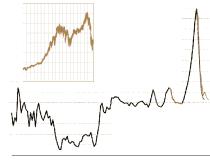 Well here on the right are a couple of things from the Internet. It’s the Dow Jones Index and the housing prices. They absolutely prove Will’s point, that greed generates its own punishment. At issue – whose greed? whose punishment? From where I sit, it looks like it’s their greed and it’s our punishment. In the world of macroeconomics, it seems that the players are sometimes able to transcend Will’s Maxim: "Greed is worse than a moral defect; it is a cause of foolish pricing." In fact, if our recent economic woes are any indicator, the whole problem revolves around the joys and profits of foolish pricing.
Well here on the right are a couple of things from the Internet. It’s the Dow Jones Index and the housing prices. They absolutely prove Will’s point, that greed generates its own punishment. At issue – whose greed? whose punishment? From where I sit, it looks like it’s their greed and it’s our punishment. In the world of macroeconomics, it seems that the players are sometimes able to transcend Will’s Maxim: "Greed is worse than a moral defect; it is a cause of foolish pricing." In fact, if our recent economic woes are any indicator, the whole problem revolves around the joys and profits of foolish pricing. 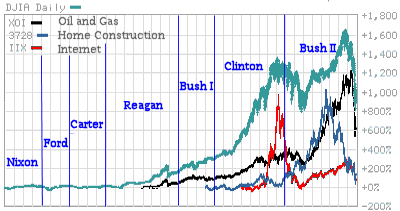 Were the forces in the marketplace as simple as those described by Will, he would be correct – the market would take care of itself. We wouldn’t need economists or columnists, for that matter. Demand exceeds supply – the prices go up. Supply exceeds demand, the prices go down. But what of those graphs? Things go spiraling up like wildfire. Things crash with equal ferocity. It didn’t have anything to do with supply or demand, and it sure didn’t fit exactly with, "when markets are allowed to operate, greed generates its own punishment." It had to do with "unseen forces" that grossly manipulated the marketplace, drained it of its value by producing waves of "financial bubbles" [falsely inflated markets], and left it to fend for itself. Those forces have been well documented here and elsewhere.
Were the forces in the marketplace as simple as those described by Will, he would be correct – the market would take care of itself. We wouldn’t need economists or columnists, for that matter. Demand exceeds supply – the prices go up. Supply exceeds demand, the prices go down. But what of those graphs? Things go spiraling up like wildfire. Things crash with equal ferocity. It didn’t have anything to do with supply or demand, and it sure didn’t fit exactly with, "when markets are allowed to operate, greed generates its own punishment." It had to do with "unseen forces" that grossly manipulated the marketplace, drained it of its value by producing waves of "financial bubbles" [falsely inflated markets], and left it to fend for itself. Those forces have been well documented here and elsewhere.